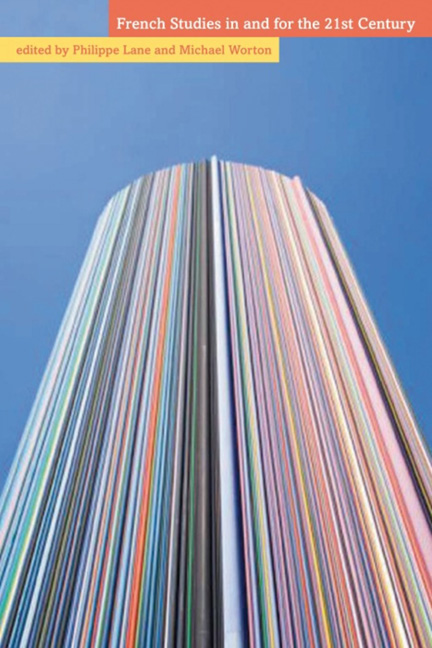Book contents
- Frontmatter
- Contents
- Notes on Contributors
- Foreword
- Foreword by His Excellency
- Part I: Contextualisations
- Part II: Research and Public Engagement Strategies
- 3 The exception anglo-saxonne? Diversity and Viability of French Studies in the UK
- 4 Why French Studies Matters: Disciplinary Identity and Public Understanding
- 5 Learning from France: The Public Impact of French Scholars in the UK since the Second World War
- Part III: The Place of Women and Gender in French Studies
- Part IV: The Place of Literature
- Part V: The Place of Linguistics in French Studies Today
- Part VI: Theatre, Cinema and Popular Culture
- Part VII: Area Studies, Postcolonial Studies and War and Culture Studies
- Part VIII: Adventures in Language Teaching
- Appendices. Addresses to the Future of French Studies Conference
3 - The exception anglo-saxonne? Diversity and Viability of French Studies in the UK
from Part II: Research and Public Engagement Strategies
- Frontmatter
- Contents
- Notes on Contributors
- Foreword
- Foreword by His Excellency
- Part I: Contextualisations
- Part II: Research and Public Engagement Strategies
- 3 The exception anglo-saxonne? Diversity and Viability of French Studies in the UK
- 4 Why French Studies Matters: Disciplinary Identity and Public Understanding
- 5 Learning from France: The Public Impact of French Scholars in the UK since the Second World War
- Part III: The Place of Women and Gender in French Studies
- Part IV: The Place of Literature
- Part V: The Place of Linguistics in French Studies Today
- Part VI: Theatre, Cinema and Popular Culture
- Part VII: Area Studies, Postcolonial Studies and War and Culture Studies
- Part VIII: Adventures in Language Teaching
- Appendices. Addresses to the Future of French Studies Conference
Summary
In March 2009, the Ministère des affaires étrangères et européennes held an international seminar in Sèvres, in collaboration with the Centre International d’Études Pédagogiques. It emerged clearly from discussions at the seminar that French provision in UK universities contrasts with that in most other EU countries in three important respects. First, UK French departments are relatively unusual in delivering a curriculum that includes a high volume and a wide variety of ‘content courses’, as practitioners often term them, alongside core language provision. Second, innovation in the delivery of that curriculum appears to be more widespread in UK universities. Increasing use is made of virtual learning environments; assessment often includes presentations and project work, as well as traditional examinations and coursework exercises; there is a high level of explicit engagement with the ‘transferable skills agenda’, which has come to occupy a central position in reflection on undergraduate teaching since the 1990s. Finally, career prospects tend to be much wider for UK graduates in French than for most of their European counterparts, for reasons that have become familiar to many language teachers in higher education. In the context of a relatively flexible graduate-level job market, where many opportunities do not require a degree in a specific subject, modern language graduates are attractive to employers: they have not only highly developed communication skills, but an autonomy and an understanding of cultural diversity that have been particularly fostered through a period of residence abroad. In other words, from a continental European standpoint, the teaching of French at UK universities appears polyvalent and innovative. To have our discipline ‘defamiliarised’ in this way, to use a venerable term from Russian Formalist aesthetics, is salutary. In what follows I explore how this defamiliarised perspective may illuminate the capacity of French Studies to evolve in the near future. As French loses its traditional preponderance within modern foreign languages in British education, what are the challenges for recruiting students – and indeed staff – and for devising curricula? Is the discipline's diversity threatened by larger processes of change, or does it enable UK departments to deal with those processes more effectively, even to take an international lead in the teaching of foreign language and culture?
- Type
- Chapter
- Information
- French Studies in and for the 21st Century , pp. 27 - 36Publisher: Liverpool University PressPrint publication year: 2011

